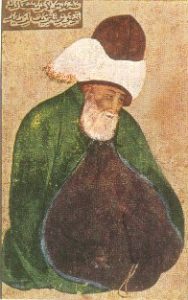Rumi’s Life

Childhood
Mevlana Jalaluddin Rumi was born on September 30, 1207 in Balkh, in present-day Afghanistan. His father, Baha ud-Din Walad, was a theologian, jurist, and a spiritual leader who played a major role in Rumi’s upbringing. Rumi was exposed to religious studies, law, and literature from an early age and he received a traditional education under his father’s guidance. However, Rumi’s childhood was marked by the turmoil of the Mongol invasions. When Rumi was a child, his family was forced to flee to Anatolia, in present-day Turkey, to escape the Mongol onslaught. This experience would have a profound impact on Rumi’s understanding of the transient nature of life and the importance of spiritual pursuits.
Education
Rumi’s education continued in Anatolia, where he was taught by his father and other scholars in religious studies, law, and literature. He also studied with other Sufi masters and learned the practices of Sufism, which had a profound influence on his spiritual development. Rumi’s education was not limited to formal studies, but also included the study of nature, human behavior, and the workings of the universe. He was an avid reader and his library included not only religious texts but also works of literature, philosophy, and science.
Live
Rumi’s life as a spiritual leader and teacher began after his father’s death. He became a respected religious leader and teacher in his own right. He began to write poetry as a way to express his spiritual experiences and insights. His poetry, which is considered some of the greatest in Persian literature, is known for its profound spiritual themes, imagery, and emotion. In 1273, Rumi met Shams of Tabriz, a wandering dervish who had a profound impact on Rumi’s spiritual development. The two formed a close friendship, and Rumi’s poetry began to take on a more mystical and personal tone. The two men spent much time together, discussing spiritual matters and Rumi’s poetry became more deeply personal and mystical.
Burial
After Shams’ disappearance, Rumi founded the Mevlevi Order, also known as the “Whirling Devishes”. Rumi continued to write and teach until his death on December 17, 1273. He was buried in Konya, Turkey, where his shrine and the Mevlana Museum are now located. The shrine has become a place of pilgrimage for many people from around the world and is considered one of the most important Sufi shrines in the world.
His poetry and teachings continue to be widely read and studied, and the Mevlevi Order, which he founded, still exists today with thousands of followers around the world. His poetry and teachings continue to be widely read and studied, and his shrine in Konya is considered one of the most important Sufi shrines in the world.
